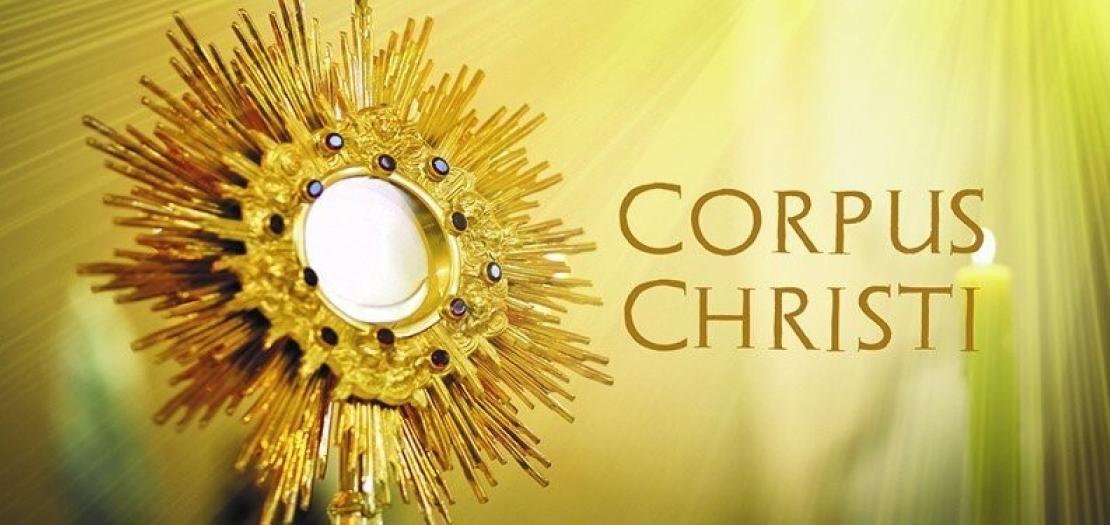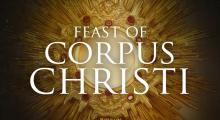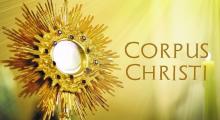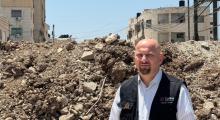Issued by the Catholic Center for Studies and Media - Jordan. Editor-in-chief Fr. Rif'at Bader - موقع أبونا abouna.org

Dearest sisters and brothers,
May the Lord give you peace!
The first suggestion for our reflections is found in the evangelist’s reference to the hunger of the people. We know very well that at the end of a hot day in a desert region, the need for refreshment and food is very great. So there is a real need for refreshment and at the same time concern for a large crowd. The evangelist tells us that there were about five thousand men. (Luke 9:14)
On the other hand, we see the poverty of the disciples, who have nothing but five loaves and two fish. (Luke 9:13) The conditions in which all this takes place are also unfavorable: it is now evening and we are in a desert region. (Luke 9:12)
In brief., the crowd has followed Jesus for a whole day, in the heat, without anything to eat, tired and hungry, but in the evening they were all still with him instead of going home.
I am always amazed by this detail and wonder if we are in the same situation as that crowd: do we really know, like those five thousand, to put aside our material needs and seek His presence, to listen to His voice, to eat of His bread, which is Himself? What are we really hungry for? What food are we looking for? There is not just one hunger, we know that very well. One can have many forms of hunger. So what is the hunger that characterizes us? What nourishes our Christian life? How much does the Eucharist sustain our life of faith? What are we searching for?
The solution the disciples propose for the hunger of the crowd is that the people go away and each seek for themselves what can satisfy their hunger (Lk 9:12) Jesus’ answer, on the other hand, is exactly the opposite and introduces us to the heart of the Eucharistic mystery: Let the people stay. (Luke 9:13) and let the disciples themselves feed everyone. In other words, not that everyone should provide for themselves, but that the disciples should share what they have with the whole crowd! A request that is humanly impossible to accomplish. Instead, this is exactly what happens. Starting with the little that was available, Jesus performs the miracle of multiplication and gives enough bread for everyone.
When we talk about hunger, we usually think of distant populations, of something theoretical. We would never have thought that even today, here among us, we are forced to talk about hunger as something real that touches the lives of our people. I am thinking of Gaza, of course, but not only Gaza. I am thinking of the many situations of poverty that the conflict has created, making life extremely hard for too many families.
So we are living in a time of real hunger. And with it comes a hunger for justice, for truth, for dignity. Even these latter seem like words that belong to a world that is far removed from our own, that has nothing to do with our real lives.
And in view of the tragic situation we are currently experiencing, perhaps we too are faced with the same temptation as the disciples, to abandon, to give up, to throw in the towel. To stop hoping and believing that it is possible to satisfy our hunger, that someone can comfort our hearts thirsting for justice and dignity, that this conflict can never change our lives, that there is no possibility of a dignified life for us here.
Jesus’ answer to the disciples, however, is clear and points to what should always characterize the life of a Christian. And so it is also the answer for us today, even for us in the Holy Land: "Give them some food yourselves."
Making a gift of self, to become the eucharistic ourselves. Being with Christ enables us to inhabit our poverty, to experience it as an opportunity for sharing and communion, for entrusting and giving. And this is also possible for us, here and now, especially for us pastors. We are not neutral instruments of the sacrament, not indifferent channels through which we simply distribute the Eucharist to the faithful. Jesus invites to first become “Eucharistic” ourselves, that is, people who give of themselves and whose lives are a constant praise to God. We are not asked to share our knowledge, but our lives in which God’s work shines. Only in this way can we give a precise and recognizable form to our flock to translate what we celebrate in the mystery into the life of the communities.
And in this time of conflict and war, Jesus’ response to the disciples is a call for our ecclesial community to translate into life what we celebrate in the Eucharist. It means that we know how to give ourselves away, that we are in solidarity with one another, that - despite everything -we continue to build relationships, open horizons, give trust, have the courage to be inclusive, i.e. to welcome the other when everything points to the opposite. It means being able to share and live, never giving up hope. Despite the many external and internal difficulties, not to renounce to ecclesial life, not to withdraw into oneself, but on the contrary, and despite everything, to always believe that Jesus, and only He, can transform the little we have, even our little faith, into a fullness of life for all.
We can’t do this on our own. We are not capable of so much. Only Jesus can give us this strength and open us up to this freedom. And only in the Eucharist, in the encounter with the dead and risen Christ who gives himself to us, can we receive this ability.
Jesus gives us a further hint in this passage. He asks us to divide those present into small groups: no longer an anonymous crowd, but small communities that are clearly defined and recognizable, in which sharing and reciprocity are easier.
He tells us that the Eucharist is the center of the community, but also that the Eucharist forms the community. Without the Eucharist, there is no community. The Eucharist creates supportive communities in which we support one another. “All the faithful were together and had everything in common... they shared with each one what he needed... and they broke bread in the houses, and partook of the food with gladness and singleness of heart.” Acts 2: 44-46)
One of the problems of our church today is precisely the anonymity of our communities, which are more like crowds than the groups of fifty that Jesus formed in our passage. We do not know each other and therefore cannot share life. The gospel invites us to give our communities a clear face and identity, built through our intimacy with Christ rather than through our social or pastoral activities.
The passage concludes with a final element: it is about what is left over that manages to fill up to twelve baskets. (Luke9:17) Where people enrich each other with the little they have, they experience that they are truly rich, that they live in abundance, that they have more than they dared to hope for.
Communities formed through the Eucharist will also be rich communities in which nothing is lacking and which, despite the poverty of means, know how to let God’s presence, our true riches, shine through.
Then may the miracle be performed once again. May the Lord multiply our few loaves and fishes. But for the miracle to happen, we must rekindle our longing for Jesus, hunger for him, be ready to make our poverty available, i.e. to accept to lose even the little we have and to place our whole life unreservedly in the hands of the Chief Shepherd. He alone can transform our fragile humanity into an instrument of salvation.
May the heavenly bread nourish and strengthen the journey of our Church of the Holy Land and, through the intercession of the Virgin Mother of the Church and our Mother, sustain us in our various vicissitudes. Amen.
+Pierbattista







